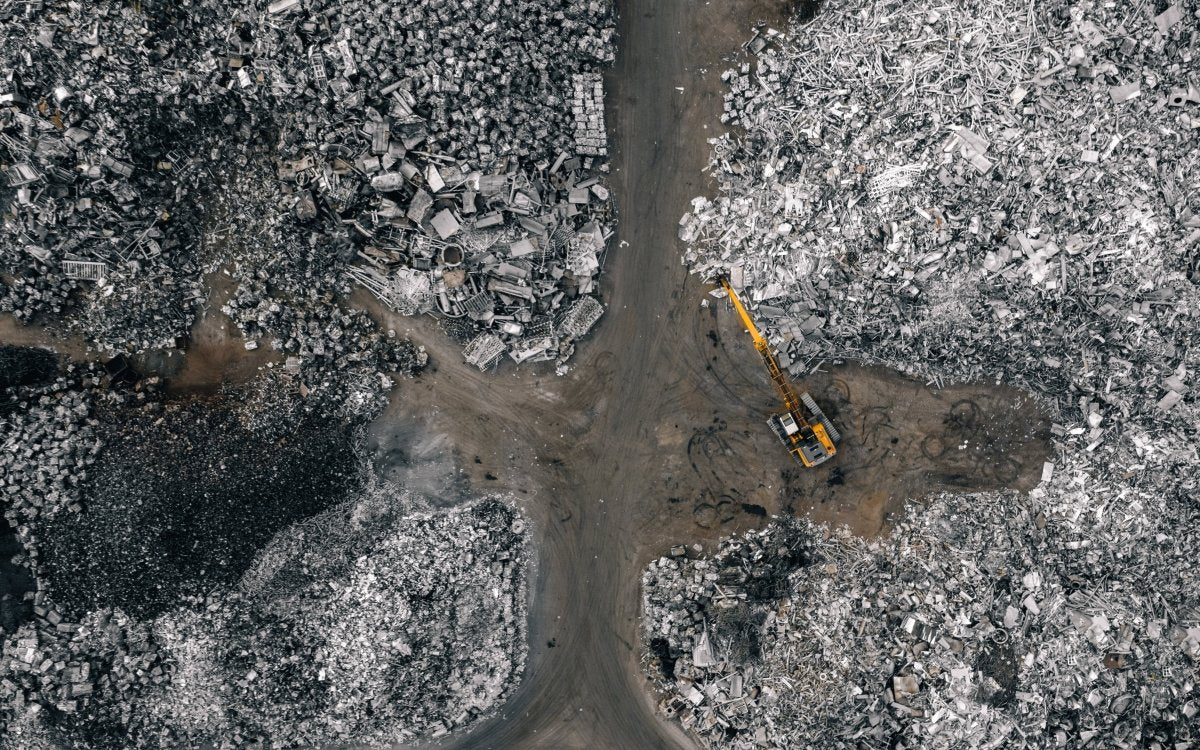Plastic waste isn’t a new problem, but it’s one that desperately needs our attention. The wasteful patterns and single-use plastics that flood every industry and home must be addressed.
How To Reduce Your Plastic Waste and Work Towards a Zero-Waste Lifestyle
Did you know that the United States generated the largest amount of plastic waste of any country in the world in 2016?
With harrowing statistics and depressing updates, it’s hard to stay positive and feel like there’s any solution.
But all it takes is some awareness and initiative on your part to make a significant change in your plastic waste. It’s never too late to start!
These are our top 10 suggestions for how to reduce your plastic waste, eliminate single-use plastics, and feel better about your environmental footprint.
1. Keep Track of Your Plastic Consumption (Awareness Is Key)
In almost any area in life, awareness is the first step to creating sustainable change. Taking the initiative to recognize how much plastic you throw away can be an earth-shattering discovery.
In fact, it just might be the motivation you need to change your habits for good.
The good news is there are so many resources available for monitoring and tracking your plastic consumption. EarthDay.org says it best: you can’t manage what you can’t measure.
So how are you going to measure your plastic waste? We’ve got two simple ideas:
- Use Earth Day’s easy-to-use plastic calculator or similar tracking tool.
- Create a journal, spreadsheet, or phone note, logging your plastic consumption.
Even if you don’t have the time or energy to commit to logging your plastic usage for a month or more, doing it for just a few weeks will promise to be enlightening. Try it out!

2. Buy Bulk Products to Reduce Plastic Waste
Life is busy, and working towards a zero-waste lifestyle isn’t always easy – it does take work.
But one thing you can do is purchase items in bulk. This helps greatly reduce the quantity of plastic used for packaging, shipping, and manufacturing. Plus, you usually get a discount for buying items in bulk.
There is still plastic in many bulk packaging options, but at least it’s less plastic waste.
Avoid single-serving foods at all costs! Pay attention when you’re purchasing bulk food – if they’re individually wrapped inside the box, it’s not reducing your plastic waste!
3. When Shopping, Choose Truly Recyclable Containers
Many overly-optimistic consumers will say that recycling is enough justification for using plastic. There are many reasons that recycling plastic doesn’t work to solve the plastic pollution problem. The biggest reason is pretty straightforward: most plastic doesn’t actually get recycled (only 9%...)
Environmentalists call this practice of recycling naively “wishcycling.”
Instead of spending energy recycling plastic, focus on materials that are proven to be recycled at much larger rates. Some of the best options include:
It becomes easier to incorporate sustainable or zero-waste alternatives into your routines with a little attention and practice.
4. Find a Trusted Zero-Waste Store for All Your Sustainable Alternatives and Zero Waste Products
Find a zero-waste store that you trust. If a store is truly plastic-free, it should be transparent about its production, products, and materials.
You can find a plethora of everyday items in most zero-waste shops.
These days the internet abounds with zero-waste alternatives like:
- Toothpaste (often, they are tablets you chew)
- Kitchen products (alternative paper towels, sustainable dish brushes)
- Laundry detergent (sheets that dissolve in water)
- Shampoo and conditioner (bars that travel through TSA like a breeze)
- Deodorant (glass jars, compostable packaging galore)
Making it easier than ever to afford and maintain a zero-waste lifestyle!
5. Bring Reusable Bags to The Grocery Store to Reduce Plastic Grocery Bag Pollution
Keep reusable bags in your car at all times for grocery trips. Grocery bags can take up to 1,000 years to decompose.
While most towns don’t have zero-waste grocery stores, you can still live a zero-waste lifestyle by supporting your local farmers’ markets or CSA’s. Many will not use plastic and are happy for you to bring your boxes or bags.
Lastly, be mindful at the grocery and buy fresh produce and meats whenever you can. Avoiding plastic packaging with pre-cut fruits and veggies or meat is an easy way to waste less plastic (and eat fresh, nutrient-dense food).

6. Explore DIY Alternatives That Can Be Stored In Reusable Containers
DIY alternatives can be so much fun! You might learn a new skill or find a new appreciation for a job you never took the time to consider.
Try starting with something simple like household cleaning products. There are plenty of recipes for non-toxic cleaning products online. Some are super simple and only require 3 inexpensive ingredients.
You can also experiment with creating some of your food and drinks. For example, consider making fresh-squeezed orange juice instead of buying plastic containers. If you have an instant pot, you could experiment with making your own yogurt with the yogurt function.
DIY alternatives are rewarding when you realize you can be independent and resourceful with your time and money. Start simple, and work your way into more complex DIY projects as you go.
7. If You Have a Baby, Switch to Cloth Diapers
In the U.S. and Europe, plastic diapers are one of the largest non-biodegradable items in landfill sites. Many consumers aren’t even aware that most disposable diapers are created from plastic. If you can’t commit to cloth diapers, at least look into bamboo or alternative materials that are more earth-friendly.
8. Avoid Excessive Packaging When At All Possible
If you’re even moderately conscious of your plastic consumption, this goes without saying. Still, many brands use excessive plastic packaging (and for what?!)
It’s not surprising that plastics’ largest market is packaging. A global shift from reusable to single-use containers in the 1950s created a demand for plastic in all industries. The impacts have been devastating to the environment.
We need to stop supporting brands making a minimal effort to appear “eco-friendly.” Support brands with refill options or 100% recycled plastic containers (if it doesn’t say 100% PCR, don’t assume it’s 100% recycled material!)
Keurig is an example of a brand that needs to do better. Disposable k-cups are extremely difficult to recycle and are flooding landfills. Even the executive leaders and the founder acknowledge that they need to find a better solution.
9. Keep Reusable Utensils and Reusable Cups For To-Go Food
We all understand the convenience of eating out. It’s tempting. You don’t always have the energy to cook at home. But it doesn’t mean you can’t be mindful of your choices.
When you’re picking up takeout on Sunday night, ask the restaurant staff not to pack reusable utensils with your meal – it doesn’t count if you take them but don’t use them! Half the battle is making the effort to ask.
Get creative and build a zero-waste kit to keep in your car with the following items:
Next time temptation hits for takeout food, you’ll be prepared, and making the sustainable choice will be easy.
10. Invest in Reusable and Refillable Alternatives
This is one of the most powerful ways to reduce your plastic waste! Find sustainable and zero-waste alternatives for your home, body, and hobbies. Every area of your life where you can implement zero-waste lifestyle habits makes a positive impact. It may feel like an insignificant choice, but it saves an incredible amount of plastic over your lifetime.
Whenever making a purchase, try to keep in mind how to reduce and reuse:
- Glass or aluminum water bottles over plastic single-use water bottles
- Travel coffee mugs over disposable coffee cups lined with plastic
- Rechargeable Batteries over batteries that will eventually sit in a landfill
- Electronic (or refillable) lighters over plastic lighters that get trashed
- Reusable Towels over paper towels that come wrapped in plastic
Other Ideas for Getting Involved in the Zero-Waste Lifestyle
Maybe one day our plastic waste will truly be eliminated. But we all have to do our part and continue to support clean-up efforts, fund environmental initiatives, and keep learning and improving.
There are plenty of opportunities to get involved such as:
- Participating in plastic pollution cleanups
- Gifting friends and family reusable items that are zero-waste or plastic-free
- Buying things in bulk and sharing with friends or family in reusable containers
Our biggest advice?
Always check a zero-waste store before buying something made of plastic. There are more and more zero-waste alternatives popping up every day!
Please do your research, look for brands that create sustainable alternatives, and show them your support. After all, they’re on a mission to save us all! Let’s find new ways to care for our planet with our consumer choices. The power is in your hands.
Check out our zero-waste store, and let us know what else you’d like to see for your journey in reducing plastic waste.



